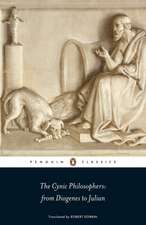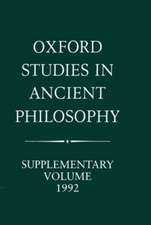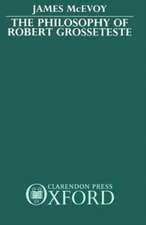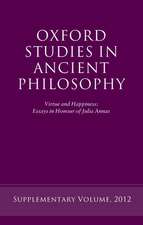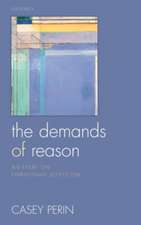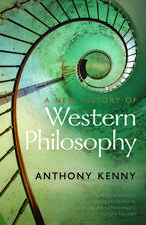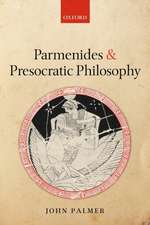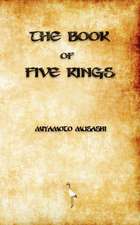Plato: A Guide for the Perplexed: Guides for the Perplexed
Autor Professor Gerald A. Pressen Limba Engleză Paperback – 23 oct 2007
It is widely agreed that Plato laid the foundations for the whole history of western thought and, well over 2000 years later, his work is still studied by every student of philosophy. Yet his thought and writings continue to evoke perplexity in readers; and perplexity (aporia) is itself a characteristic of many of his writings, a recurrent motif of his thought, and apparently an important stage one must pass through along the path to wisdom that Plato presents.
Plato: A Guide for the Perplexed is a clear and thorough account of Plato's philosophy, his major works and ideas, providing an ideal guide to the important and complex thought of this key philosopher. The book offers a detailed review of all the major dialogues and explores the particular perplexities of the dialogue form. Geared towards the specific requirements of students who need to reach a sound understanding of Plato's thought, the book also provides a cogent and reliable survey of the whole history of Platonic interpretation and his far-reaching influence. This is the ideal companion to the study of this most influential and challenging of philosophers.
| Toate formatele și edițiile | Preț | Express |
|---|---|---|
| Paperback (1) | 256.49 lei 6-8 săpt. | |
| Bloomsbury Publishing – 23 oct 2007 | 256.49 lei 6-8 săpt. | |
| Hardback (1) | 771.91 lei 6-8 săpt. | |
| Bloomsbury Publishing – 23 oct 2007 | 771.91 lei 6-8 săpt. |
Din seria Guides for the Perplexed
- 14%
 Preț: 164.68 lei
Preț: 164.68 lei - 14%
 Preț: 163.34 lei
Preț: 163.34 lei - 14%
 Preț: 179.10 lei
Preț: 179.10 lei -
 Preț: 145.10 lei
Preț: 145.10 lei - 14%
 Preț: 133.15 lei
Preț: 133.15 lei -
 Preț: 166.82 lei
Preț: 166.82 lei - 14%
 Preț: 170.50 lei
Preț: 170.50 lei - 24%
 Preț: 150.50 lei
Preț: 150.50 lei - 8%
 Preț: 145.90 lei
Preț: 145.90 lei -
 Preț: 178.22 lei
Preț: 178.22 lei - 15%
 Preț: 163.01 lei
Preț: 163.01 lei - 14%
 Preț: 165.03 lei
Preț: 165.03 lei - 8%
 Preț: 157.75 lei
Preț: 157.75 lei - 14%
 Preț: 164.93 lei
Preț: 164.93 lei - 14%
 Preț: 164.76 lei
Preț: 164.76 lei - 22%
 Preț: 164.31 lei
Preț: 164.31 lei - 9%
 Preț: 156.88 lei
Preț: 156.88 lei - 15%
 Preț: 162.99 lei
Preț: 162.99 lei - 22%
 Preț: 565.55 lei
Preț: 565.55 lei - 14%
 Preț: 163.87 lei
Preț: 163.87 lei - 19%
 Preț: 158.90 lei
Preț: 158.90 lei - 19%
 Preț: 170.25 lei
Preț: 170.25 lei - 22%
 Preț: 595.65 lei
Preț: 595.65 lei -
 Preț: 215.33 lei
Preț: 215.33 lei - 22%
 Preț: 712.64 lei
Preț: 712.64 lei - 14%
 Preț: 164.13 lei
Preț: 164.13 lei - 14%
 Preț: 164.76 lei
Preț: 164.76 lei - 14%
 Preț: 145.10 lei
Preț: 145.10 lei - 14%
 Preț: 144.83 lei
Preț: 144.83 lei - 22%
 Preț: 595.32 lei
Preț: 595.32 lei - 20%
 Preț: 190.50 lei
Preț: 190.50 lei - 14%
 Preț: 176.25 lei
Preț: 176.25 lei - 14%
 Preț: 163.08 lei
Preț: 163.08 lei - 22%
 Preț: 567.17 lei
Preț: 567.17 lei - 20%
 Preț: 177.77 lei
Preț: 177.77 lei - 22%
 Preț: 770.86 lei
Preț: 770.86 lei - 14%
 Preț: 163.96 lei
Preț: 163.96 lei - 22%
 Preț: 946.89 lei
Preț: 946.89 lei - 14%
 Preț: 145.01 lei
Preț: 145.01 lei - 20%
 Preț: 176.25 lei
Preț: 176.25 lei - 14%
 Preț: 595.17 lei
Preț: 595.17 lei
Preț: 256.49 lei
Preț vechi: 294.87 lei
-13% Nou
Puncte Express: 385
Preț estimativ în valută:
49.08€ • 51.24$ • 40.62£
49.08€ • 51.24$ • 40.62£
Carte tipărită la comandă
Livrare economică 04-18 aprilie
Preluare comenzi: 021 569.72.76
Specificații
ISBN-13: 9780826491763
ISBN-10: 0826491766
Pagini: 250
Dimensiuni: 138 x 216 x 19 mm
Greutate: 0.31 kg
Editura: Bloomsbury Publishing
Colecția Continuum
Seria Guides for the Perplexed
Locul publicării:London, United Kingdom
ISBN-10: 0826491766
Pagini: 250
Dimensiuni: 138 x 216 x 19 mm
Greutate: 0.31 kg
Editura: Bloomsbury Publishing
Colecția Continuum
Seria Guides for the Perplexed
Locul publicării:London, United Kingdom
Caracteristici
Plato is the ideal subject for a book such as this - a major philosopher, widely studied in philosophy departments, but whose work and ideas students find particularly challenging.
Cuprins
Introduction
Part I. Backgrounds
1. Plato's Life and Works
2. The Contexts for Interpreting Plato's Dialogues
Part II. Sources of Perplexity: Change
3. A Brief History of Platonism and Plato Interpretation
4. Dialogue Form
5. Arguments and Ideas, Vision and Doctrines
6. Fables, Myths, and Stories
7. Irony and other forms of humor
8. Play and seriousness
9. Paradox
Part III. Plato's Philosophy: Permanence
10. Platonic Anonymity and the Nature of Plato's Philosophy
11. Persistent Themes and Plato's Vision
12. The Platonic Path to Wisdom
Part IV: Help in Reading and Understanding Plato's Dialogues and His Philosophy
Part I. Backgrounds
1. Plato's Life and Works
2. The Contexts for Interpreting Plato's Dialogues
Part II. Sources of Perplexity: Change
3. A Brief History of Platonism and Plato Interpretation
4. Dialogue Form
5. Arguments and Ideas, Vision and Doctrines
6. Fables, Myths, and Stories
7. Irony and other forms of humor
8. Play and seriousness
9. Paradox
Part III. Plato's Philosophy: Permanence
10. Platonic Anonymity and the Nature of Plato's Philosophy
11. Persistent Themes and Plato's Vision
12. The Platonic Path to Wisdom
Part IV: Help in Reading and Understanding Plato's Dialogues and His Philosophy
13. How to Read a Platonic Dialogue
14. Summaries of the Dialogues
Glossary of Greek Terms
Bibliography
Recenzii
"[The book] is comprehensive, full of useful advice for anyone teaching Plato at any level. Press gives us the information we need to have at our fingertips, but his suggestions only increase the excitement of reading the dialogues themselves." - Debra Nails, Professor of Philosophy, Michigan State University, USA
"It appears that things have changed in Plato scholarship during the quarter century that has elapsed since I was trained as an undergraduate in philosophy and classical languages and, consequently, a book that I cannot recommend enough is Gerald A. Press, Plato: A Guide for the Perplexed." - Peter Wright, Teaching for Inclusion: Difficult Dialogues (Blog), July 25, 2008
"a book such as Press's is very timely. It works out in detail the implications of Plato's use of the dialogue as a literary form, and suggests ways of reading the dialogues in the light of this, recognising such things as the mixture of truth and fiction, the use of irony and the use of myth" The international journal of the platonic tradition, 2009
"It appears that things have changed in Plato scholarship during the quarter century that has elapsed since I was trained as an undergraduate in philosophy and classical languages and, consequently, a book that I cannot recommend enough is Gerald A. Press, Plato: A Guide for the Perplexed." - Peter Wright, Teaching for Inclusion: Difficult Dialogues (Blog), July 25, 2008
"a book such as Press's is very timely. It works out in detail the implications of Plato's use of the dialogue as a literary form, and suggests ways of reading the dialogues in the light of this, recognising such things as the mixture of truth and fiction, the use of irony and the use of myth" The international journal of the platonic tradition, 2009


